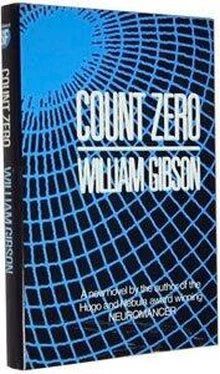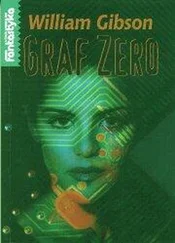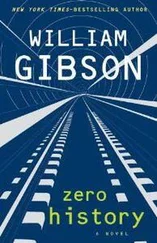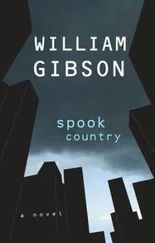“Was that it, Finn, just software?” Lucas asked.
“Yeah, mainly, except for these weird sculpture things. I’d forgotten that. I figured the Wig made ’em. First time a guy came in with one of those, I bought the ’ware he had, then said what the fuck do you call that? Wig said you might be interested, the guy said. Tell him he’s crazy, I said. The guy laughed. Well, you keep it, he says I’m not carrying the Goddamn thing back up with me. I mean, it was about the size of a deck, this thing, just a bunch of garbage and shit, stuck together in a box… So I pushed it behind this Coke crate fulla scrap iron, and forgot it, except old Smith — he’s a colleague of mine in those days, dealt mostly art and collectibles — she sees it and wants it. So we do some dipshit deal. Any more of these, Finn, he says, get ’em. There’s assholes uptown go for this kind of shit. So the next time a guy turned up from the Wig, I bought the sculpture thing, too, and traded it to Smith. But it was never much money for any of it… The Finn shrugged. “Not until last month, anyway. Some kid came in with what you bought. It was from the Wig. Listen. he says, this is biosoft and its a breaker. Wig says it’s worth a lot. I put a scan on it and it looked right. I thought it looked interesting, you know? Your partner Beauvoir thought it looked pretty interesting, too. I bought it. Beauvoir bought it off me. End of story.” The Finn dragged out a cigarette, this one broken, bent double. “Shit,” he said He pulled a faded pack of cigarette papers from the same pocket and extracted one of the fragile pink leaves, rolling it tightly around the broken cigarette, a sort of splint. When he licked the glue, Bobby caught a glimpse of a very pointed gray-pink tongue.
“And where, Finn, does Mr. Wig reside?” Lucas asked, his thumbs beneath his chin, his large fingers forming a steeple in front of his face.
“Lucas, I haven’t got the slightest fucking clue. In orbit somewhere. And modestly, if the kind of money he was getting out of me meant anything to him. You know, I hear there’s places up there where you don’t need money, if you fit into the economy, so maybe a little goes a long way. Don’t ask me, though, I’m agoraphobic.” He smiled nastily at Bobby, who was trying to get the image of that tongue out of his mind. “You know,” he said, squinting at Lucas, “it was about that time that I started hearing about weird shit happening in the matrix.”
“Like what?” Bobby asked.
“Keep the fuck out of this,” the Finn said, still looking at Lucas. “That was before you guys turned up, the new hoodoo team. I knew this street samurai got a job working for a Special Forces type made the Wig look flat fucking normal. Her and this cowboy they’d scraped up out of Chiba, they were on to something like that. Maybe they found it. Istanbul was the last I saw of ’em. Heard she lived in London, once, a few years ago. Who the fuck knows? Seven, eight years.” The Finn suddenly seemed tired, and old, very old. He looked to Bobby like a big, mummified rat animated by springs and hidden wires. He took a wristwatch with a cracked face and a single greasy leather strap from his pocket and consulted it. “Jesus. Well, that’s all you get from me. Lucas. I’ve got some friends from an organ bank coming by in twenty minutes to talk a little biz.”
Bobby thought of the bodies upstairs. They’d been there all day.
“Hey,” the Finn said, reading the expression on his face, “organ banks are great for getting rid of things. I’m paying them. Those motherless assholes upstairs, they don’t have too much left in the way of organs…” And the Finn laughed.
“You said he was close to… Legba? And Legba’s the one you and Beauvoir said gave me luck when I hit that black ice?”
Beyond the honeycomb edge of the geodesics, the sky was lightening.
“Yes,” Lucas said. He seemed lost in thought.
“But he doesn’t seem to trust that stuff at all.”
“It doesn’t matter,” Lucas said as the Rolls came into view. “He’s always been close to the spirit of the thing.”
THE PLANE HAD GONE to ground near the sound of running water. Turner could hear it, turning in the g-web in his fever or sleep, water down stone, one of the oldest songs The plane was smart, smart as any dog, with hard-wired instincts of concealment. He felt it sway on its landing gear, some-where in the sick night, and creep forward, branches brushing and scraping against the dark canopy. The plane crept into deep green shadow and sank down on its knees, its airframe whining and creaking as it flattened itself, belly down, into loam and granite like a manta ray into sand. The mimetic polycarbon coating its wings and fuselage mottled and darkened, taking on the colors and patterns of moon-dappled stone and forest soil. Finally it was silent, and the only sound was the sound of water over a creekbed.
He came awake like a machine, eyes opening, vision plugged in, empty, remembering the red flash of Lynch’s death out beyond the fixed sights of the Smith Wesson. The arc of the canopy above him was laced with mimetic approximations of leaves and branches Pale dawn and the sound of running water He was still wearing Oakey’s blue work shirt It smelled of sour sweat now, and he’d ripped the sleeves out the day before. The gun lay between his legs, pointing at the jet’s black joystick. The g-web was a limp tangle around his hips and shoulders. He twisted around and saw the girl, oval face and a brown dried trickle of blood beneath a nostril She was still out, sweating, her lips slightly parted, like a doll’s.
“Where are we?”
“We are fifteen meters south-southeast of the landing coordinates you provided,” the plane said. “You were unconscious again. I opted for concealment.”
He reached back and removed the interface plug from his socket, breaking his link with the plane. He gazed dully around the cockpit until he found the manual controls for the canopy. It sighed up on servos, the lacework of polycarbon leaves shifting as it moved. He got his leg over the side, looked down at his hand flat against the fuselage at the edge of the cockpit. Polycarbon reproduced the gray tones of a nearby boulder; as he watched, it began to paint a hand-sized patch the color of his palm He pulled his other leg over, the gun forgotten on the seat, and slid down into earth and long sweet grass. Then he slept again, his forehead against the grass and dreamed of running water.
When he woke, he was crawling forward on his hands and knees, through low branches heavy with dew. Finally he reached a cleaning and pitched forward, rolling over, his arms spread in what felt like surrender. High above him, something small and gray launched itself from one branch, caught an-other, swung there for an instant, then scrambled away, out of his sight.
Lie still, he heard a voice telling him, years away. Just lay out and relax and pretty soon they’ll forget you, forget you in the gray and the dawn and the dew. They’re out to feed, feed and play, and their brains can’t hold two messages, not for long. He lay there on his back, beside his brother, the nylon-stocked Winchester across his chest, breathing the smell of new brass and gun oil, the smell of their campfire still in his hair. And his brother was always right, about the squirrels. They came. They forgot the clear glyph of death spelled out below them in patched denim and blue steel; they came, racing along limbs, pausing to sniff the morning, and Turner’s .22 cracked, a limp gray body tumbling down. The others scattered, vanishing, and Turner passed the gun to his brother. Again, they waited, waited for the squirrels to forget them.
“You’re like me,” Turner said to the squirrels, bobbing up out of his dream. One of them sat up suddenly on a fat limb and looked directly at him. “I always come back.” The squirrel hopped away. “I was coming back when I ran from the Dutchman. I was coming back when I flew to Mexico. I was coming back when I killed Lynch.”
Читать дальше











